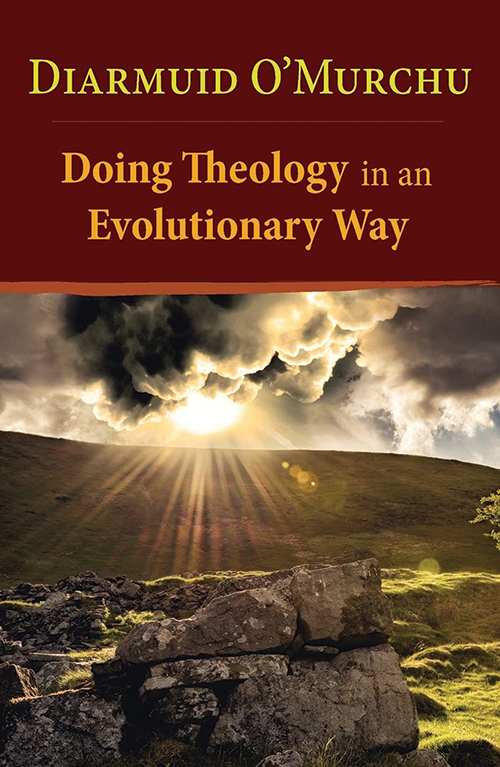
Doing Theology in an Evolutionary Way
Reviewed by Rob Pierson
November 1, 2021
By Diarmuid O’Murchu. Orbis Books, 2021. 232 pages. $24/paperback; $19.50/eBook.
Buy from QuakerBooks
A Church that seeks to follow where the Spirit leads will have to expect the unexpected and be prepared to be shaken to its core. —James D. G. Dunn (quoted in Doing Theology in an Evolutionary Way)
Diarmuid O’Murchu is a social psychologist living in Dublin. He belongs to the Sacred Heart Missionary Order (a Catholic order making known the love of Jesus) and has spent most of his life working in social ministry. His latest book, Doing Theology in an Evolutionary Way, continues themes from his many earlier works such as Quantum Theology, In the Beginning Was the Spirit, and Beyond Original Sin.
O’Murchu sees himself “clearing the clutter and rubble that have accumulated over the Christian centuries.” Theology, he feels, has historically pursued one of two troubling paradigms. On the one hand, what he calls the “codependent paradigm” emphasizes the flawed nature of everything in creation, particularly humans in their sinful, fallen state. On the other hand, the “imperial Judeo-Christian” paradigm perpetuates an imperial model of the kingdom of God in the structures of the church—despite everything Jesus said and did to question the empire and religious structures of his time. O’Murchu sees both paradigms as damaging—creating psychological codependency, fostering allegiance to patriarchy, and making religion a tool to dominate and control.
In contrast to these two dominant paradigms, O’Murchu welcomes a new “evolutionary paradigm,” which is not really that new, since it has been emerging for some time now. This paradigm emphasizes the Spirit’s active role in creation as “a cosmic unfolding process” of which we are part. God becomes “the Great Birther” rather than the great ruler, and we discern “God at work in the mystery of creation at large.” With God incarnate in and through all of creation, we become participants and collaborators in a story that no longer centers on us, neither begins nor ends on human timescales. (“We need to adjust to God’s timescales,” O’Murchu advises.) Spirit embodies itself in evolution, in the creative process of birth, death, and rebirth. In fact, “[l]ong before Jesus ever underwent death and resurrection,” writes O’Murchu, “it was already occurring throughout the entire universe.”
O’Murchu isn’t writing to Quakers or about Quakers, but at times I felt the author was daydreaming about Quakers without having talked to any. For example, O’Murchu envisions the emergence of local lay religious communities more concerned with orthopraxy than orthodoxy and guided by “informed, discerning consensus.” These faith communities embrace new truth, engage in the world, and reject patriarchy and priesthood. The faithful strive “to live in more God-like ways, rather than theorizing about the Godhead.” Rather than creed, text, or tradition, the community emphasizes Spirit, and spiritual integrity becomes a central concern: reintegrating sacred and secular, reconnecting spirit and body, faith and earth. Some of his thoughts on incarnation and embodiment felt timely to me as a Quaker motivated by these concerns.
But I suspect most theologians would balk at O’Murchu’s generalizations. He tends to shoehorn all of Catholic thought (or all Christian denominations, or all the world’s religions!) into one pair of narrow theological shoes. In that sense, the book aims primarily at Christian readers who feel cramped in their faith and are looking for better theological sneakers. For those already running laps around the fields of evolution and faith, the science here feels a bit familiar and fuzzy: for example, sometimes invoking quantum physics with words such as “mystical” and “energy force.”
Despite those objections, Doing Theology in an Evolutionary Way offers some good insights, particularly on spiritual embodiment and living life at home in this world. O’Murchu wants to heal those damaged by current Christian paradigms, and his book calls for another way forward: a way that abandons the defense of creedal beliefs in order to embrace the dynamism of God’s actual universe.
Rob Pierson is a member of Albuquerque (N.M.) Meeting with an enduring interest in both science and faith. He is grateful for having spent time among theologians during his studies at Earlham School of Religion as well as time in the creation among the rocks, beetles, acorns, and stars.
No comments:
Post a Comment